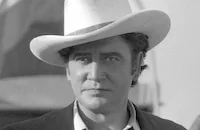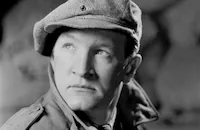Special Investigator

Brief Synopsis
Cast & Crew
Louis King
Richard Dix
Margaret Callahan
Erik Rhodes
Owen Davis Jr.
Ray Mayer
Film Details
Technical Specs

Synopsis
When his brother George, an agent for the Federal Bureau of Investigation, is killed during a raid on suspected gold thieves, California criminal lawyer Bill Fenwick, whose success as a gangster "mouthpiece" has brought him dubious notoriety, quits his lucrative practice and joins the Justice Department. Determined to find George's killer, Bill takes a tip from former client Bennie Gray that the gangsters are "re-mining" the stolen gold as ore and investigates a story that the Gold Bar Mine of Quartzburg, Nevada has reopened after a sudden gold strike. In Quartzburg, Bill, who has opened a law office under the name Richard Galt, meets attractive Virginia Selton and, aware that she is connected to the Gold Bar, follows her to Reno one night. There Virginia, who is the sister of George's killer, wounded gangster Edward J. Selton, picks up Dr. Vic Reynolds at the Reno airport. On the highway back to the ranch, Virginia's automobile, which has been sabotaged by Bill, breaks down, and Bill conveniently offers the duo a ride. Attracted to Bill, Virginia allows him to drive to the ranch and introduces him to Jim Plummer and the other gangsters. While Reynolds doctors Selton, Plummer and Bill, who describes himself as a small-town lawyer, play a tense hand of poker. Eager for information, Bill returns to the ranch the next day and soon develops a close relationship with Virginia. Plummer, however, suspects Bill and, overriding Selton's orders to leave him alone, has another gangster shoot at him. When Virginia is wounded instead, Selton, weak with fever, rails against Plummer. Then Bill learns that Virginia is Selton's sister and that the F.B.I. is planning a midnight raid on the ranch. Anxious to protect Virginia, Bill takes her dancing in Reno, where Bennie and a former girl friend unwittingly expose him to the gangsters. Alerted, Plummer decides to flee the ranch and, after tying up Selton, steals the gold. Plummer then takes Virginia hostage, but before he and his men escape, Selton breaks free and confronts them at gunpoint. Sure that Virginia has betrayed him, Selton calls her a "rat," and begins shooting at Plummer. As the surviving gangsters attempt to flee, the police apprehend them, while Bill faces Selton, who finally succumbs to his wounds. His revenge satisfied, Bill comforts Virginia as they drive away from the ranch.

Director
Louis King
Cast

Richard Dix
Margaret Callahan

Erik Rhodes

Owen Davis Jr.
Ray Mayer
Harry Jans

Joseph Sawyer

J. Carrol Naish

Sheila Terry

J. M. Kerrigan
Jed Prouty

Russell Hicks
Si Jenks
Ethan Laidlaw
Crew
Jimmy Anderson
Samuel J. Briskin
Edward Cronjager
Feild Gray
George Hively
Thomas Lennon
Van Nest Polglase
Cliff Reid
Ferdinand Reyher
Lynn Shores
Louis Stevens
Edward Stevenson
John E. Tribby
Roy Webb

Film Details
Technical Specs

Articles
Special Investigator
By Richard Harland Smith

Special Investigator
Quotes
Trivia
Notes
The working title of this film was Fugitive Gold. A Hollywood Reporter news item announced that Baby Marie Osborne, a former child star who was working as Ginger Rogers' stand-in, had been cast in her first adult role in this production, but her participation in the final film has not been confirmed. According to Hollywood Reporter production charts, Boothe Howard and Frank M. Thomas were cast members, but their participation in the final film has not been confirmed. Modern sources state that this film made $91,000 in profits for RKO.














